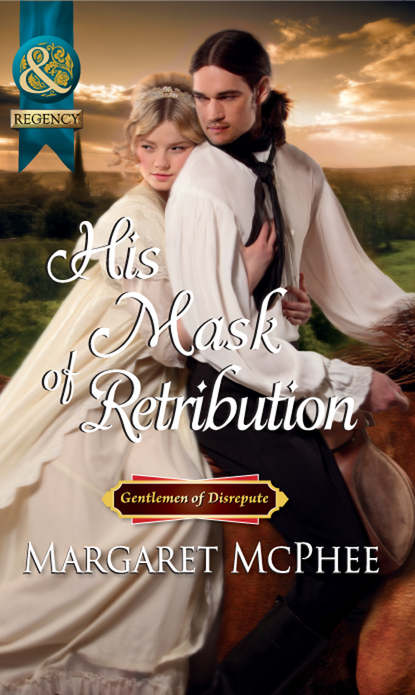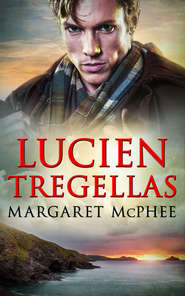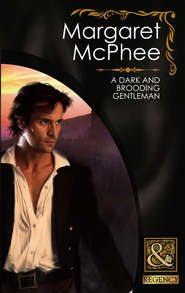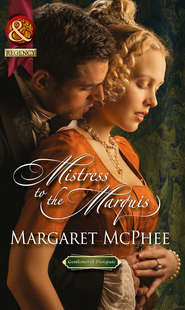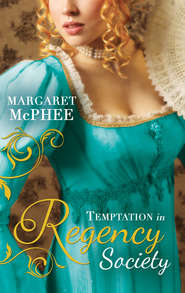По всем вопросам обращайтесь на: info@litportal.ru
(©) 2003-2024.
✖
His Mask of Retribution
Настройки чтения
Размер шрифта
Высота строк
Поля
‘We keep her until he does.’ The highwayman was so adamant that she knew his accomplice would not persuade him. He meant to keep her and heaven only knew what he would do to her. He glanced round, saw she was listening and pulled his accomplice further away, turning his back so that she would not hear their words. They were so intent on their conversation that they did not hear the sound of feet and voices, children’s shouts and a man’s growl. The door opened and four children ran in, and behind them, a man and a woman carrying a puppy wrapped in a filthy shawl.
The children did not seem fazed to find the highwayman, his accomplice and Marianne.
‘All right, governor?’ The oldest fair-haired boy sauntered across the room and gave the highwayman a nod.
‘Tom,’ the man snapped at the boy, but the boy was not cowed in the slightest. ‘Beggin’ your pardon, sir,’ said the man to the highwayman. ‘We thought you would be gone. Excuse us and we’ll leave you to your business.’ And then in roughened tones to the children, ‘Out, the lot of you.’ His head gestured to the still-open door.
One of the boys emitted a harsh hacking cough and the puppy began to whine. The family smelled of dampness and dog and unwashed bodies.
‘Our business is done for today,’ replied the highwayman. ‘Here…’ He slipped his hand into his pocket and she saw the glint of gold. The children gathered around him like flies round a honeypot. Her gaze slid to the open door and the woman standing beside it. All eyes were on the highwayman’s gold. Marianne did not hesitate. She hitched up her skirts and she ran.
‘Stop her!’ She heard the highwayman’s shout. ‘Marianne, no! This place is danger—’ But she slammed the door shut behind her and did not look back.
She hurled herself down the close, through the gaping main door and out into the street. The clatter of her shoes was loud against the stones, seeming to echo against the crowding walls all around. Shabby clothing hung on washing lines strung high between the houses, flapping dark and grey and damp. Marianne dodged beneath them and kept on running, ignoring the sharp press of the cobbles through her thin leather soles. A quick glance behind and she could see his dark figure further down the street, running so fast that the tails of his greatcoat were spread and billowing behind him like great black wings.
‘God help me!’ she whispered and, ignoring the stitch in her side, pushed herself to run faster, knowing that she could not afford to let him catch her. The paving was uneven and covered in filth. A dog snapped at her heels and a woman sitting in a doorway swigging from a bottle shouted something at her and laughed, but she kept on running. She stumbled, almost sprawling her length as she caught her foot in a hole in the road, but righted herself without slowing. Round the corner, she dived up a narrow alleyway to her right and the next one on her left, crisscrossing, desperate to find a way out, but every turn just seemed to take her deeper into the forest of houses.
The streets were growing narrower and darker, the buildings taller and more rickety; the people she passed were more sharp-faced and beady-eyed. Her breathing was so hard she could taste blood at the back of her throat, so loud that it masked the sounds around her. She knew she could not keep going, that she was spent. She dodged into another narrow street on her right and shrank back against the wall, closing her eyes and gasping air into her lungs. Her side ached like the stab of a knife blade with every breath.
There was no sound of the highwayman’s footsteps. No sound of anything except the distant hum of everyday life and her own panting breath. She had lost him. She had escaped. She breathed her relief.
And then the scent of tobacco smoke drifted to her nose and Marianne knew that she was not alone. She opened her eyes and looked around her. A little further up the street, three men lounged completely motionless against the fronts of the houses. Their clothing was all browns and greys, merging with the stonework of the buildings. Two sucked on long thin clay pipes. All three watched her with sharp hungry faces.
And for all that Marianne had sought to escape the highwayman, she knew these men were different. They would give her no assurances. Their fight was not with her father.
Her stomach dipped with dread. She made no sudden movement, even though every muscle was primed and tensed to flee. She glanced to her right towards the mouth of the street. Another two men were taking up the breadth of it, silent in their drab dirty clothes, and blocking her exit. There was a hollow sickness in her stomach and her heart was pounding in the base of her throat. She looked to her left, wondering if she stood a chance of running past the men, but a thin-faced man with a scar down his cheek was watching from the shelter of the close and another man, a great big bear of a man, was sitting on the step. And she was afraid, more desperately afraid than ever. Moving slowly, calmly, as if they were a pack of wolves, she edged away from the wall.
The thin-faced man stepped out of the close into the narrow street and it seemed to be a signal, for the other men moved to gather behind his lead.
She took her chance and whirled, trying to dodge past the two that guarded the exit of the street, but there was no way past them and she was forced back.
‘Don’t be in such a hurry to leave,’ one of them said. ‘There’s plenty of fun to be had for a pretty little thing like you.’ She saw his eyes rake her body before returning to rest upon her face. He licked his lips slowly, meaningfully, with a fur-coated tongue. Marianne glanced behind her at the advancing group of men.
‘No way out, darlin’,’ said the man who had spoken before. ‘Smile at me and I’ll be gentle with you.’ And he laughed.
She knew what they were going to do to her. She knew, and there was nothing that she could do to stop them. Nothing was going to stop them. She opened her mouth to scream—and then she saw the tall dark figure step into the mouth of the street.
Chapter Three
Marianne knew it was the highwayman, but he was alone and there were seven men around her. He walked forwards and the expression of darkness and ferocity on his face made her stomach flip. The ruffians began to close with eagerness upon him, but he did not hesitate, just kept on walking.
One of the villains gave a mocking laugh. ‘You think we’re scared because you’re wearing a bleedin’ mask?’
She did not hear the highwayman’s answer. There was only the sickening sound of bone crunching against bone and the villain laughed no more. A hand closed tight around her upper arm and the thin-faced man looked down into her face.
‘Unhand me!’ She struggled to free herself, but the thin-faced man only smirked at her efforts.
She could not see the highwayman properly, but she could hear every fist that landed, could hear the grunts and the gasps and the curses from the ruffians. There was such menace about him that it made that of the villains pale to insignificance. The men before him seemed to crumple. One was thrown against a wall, slithering down to lie in a limp and bloodied heap. Another turned tail and ran away. She had never seen such power, such strength, such utter ruthlessness. It shook her to the very core. And it shook the thin-faced man too. With a snarl of disgust he gestured the biggest, heaviest-set of his men towards the highwayman. The villain was a giant of a man, his fists huge and scarred, and as Marianne watched he slipped a wicked-looking hunting knife from his pocket.
‘Come on, darlin’, me and you’ve got some business together. Fitz’ll take care of the distraction.’ The thin-faced man manhandled her towards the mouth of the close.
‘No!’ She struggled against him, straining for release, and her eyes met the highwayman’s across the carnage just for a moment. Something passed between them, something she did not understand. He was her enemy and yet he was also her only hope. He was different from the men in the rookery. He was different from any man that she had ever seen. His gaze shifted to focus on the men between them. She watched it harden, and darken, and she shivered just to see it. She stared in awe, wanting both to run to, and away from him. The thin-faced man’s fingers bit all the harder into her arm as he wrenched her so roughly that she lost her footing and went down on her knees. He yanked her up and dragged her towards the building in which she had first seen him. And behind her she could hear the sounds of the fight intensify.
They were just inside the close when the scream pierced the air. A scream of pain and of terror. A scream that made her scalp prickle and her blood run cold. Then there was silence. She strained her neck and saw the big villain lying curled on the ground sobbing like a baby. And the highwayman was still coming: relentless, unstoppable.
Knight saw Marianne Winslow being dragged towards a house by a thin-faced man. Her eyes were fixed on his and in that moment he saw her with all of her armour and pretence stripped away: her soul, bared in such honesty, and vulnerable. She was not Misbourne’s daughter now, but a woman in her own right—one who was in grave danger because of him. He felt the extent of her fear, felt her unspoken plea reach in and touch him in a place he had thought lost long ago. Something inside him seemed to boil up and spill over. There were two men between him and Marianne. Knight knew that time was running out.
‘Come on then, mate,’ taunted the stockier of the two. ‘Show us what you’ve got.’ The black-toothed ruffian moved his fingers in a beckoning gesture. ‘We don’t fight with Queensbury rules he—’
Knight smashed his fist as hard as he could into the ruffian’s nose. The man dropped and did not get up.
The sole remaining villain was backing away with his hands raised in surrender. ‘You can ‘ave ‘er.’ The man’s face was pale beneath the grime. ‘Just don’t hit me, mate.’ A telltale wet patch spread across the fall of the man’s trousers as he spoke. Knight hit him anyway and kept on moving into the close.
From above came the sounds of the struggle. A door slammed, muffling the sounds. He took the stairs two at a time, up to the first floor, hearing the struggle grow louder as he ran. He kicked open the door and saw Marianne backed against the wall watching in terror while, in the middle of the room, the villain unfastened his trousers. Both faces shot round to him.
‘What the hell…?’ The villain scrabbled at the open fall of his trousers, his shifty grey eyes taking in Knight’s highwayman clothes and the kerchief that still masked his face. ‘Piss off and get your own.’
‘She’s mine,’ said Knight.
‘This is my territory—that makes her mine.’ The thin-faced man pulled a razorblade from the pocket of his jacket and brandished it at Knight. ‘Now piss off. Three’s a crowd.’
‘I agree.’ But instead of retreating, Knight walked straight for the man. His left hand caught the wrist that swiped the razor at Knight’s neck; his right grabbed the back of the half-mast breeches and, before the villain could react, ran him headlong out of the window.
When he turned back to Marianne she had not moved one inch; just stood there frozen, spine against the wall.
‘You killed him,’ she whispered.
He let the lethality fade from his face. ‘I doubt it. We’re only one floor up. Probably just broke a few bones.’ He paused. ‘Did he hurt you?’
Her gaze clung to his. ‘No.’
Thank God!
Her voice was quiet and calm, but her face was pale as death and he could see the shock and fear that she had not yet masked in her eyes.
Someone outside started to scream.
‘We have to leave here. Now.’ But she still made no move, just stared at him as if she could not believe what was happening.
‘Lady Marianne,’ he pressed, knowing the urgency of their predicament. He took hold of her arm and together they ran from the room.
The kitchen of Knight’s house in Craven Street was warm and empty save for the two men that sat at the table. The stew that Callerton had prepared earlier was still cooking within the range, its aroma rich in the air. There was the steady slow tick from the clock fixed high on the wall between the windows. The daylight was subdued through the fine netting that Callerton had fitted across the window panes, lending the room an air of privacy.
‘You were out of sight by the time I got out of there. And I knew you wouldn’t go back to the room,’ Callerton said. He unstoppered the bottle of brandy sitting on the scrubbed oak of the kitchen table between them and poured some into each of the two glasses.
Knight gave a nod. They both knew the arrangements if something went wrong. ‘How is she?’
‘She’s resting.’





